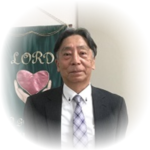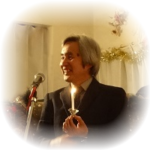↓Audio link to the sermon:
(If you can’t listen on your iPhone, please update your iOS)
Today’s message is titled “Bread, Yeast, and Blindness.” In the passage we will read, there is yet another story about bread. In fact, it’s the second time in Mark when Jesus feeds a large crowd with just few loaves of bread. When the Bible repeats something, it’s probably important, so we should pay attention to what is repeated. After the feeding of the crowd, Jesus heals a blind man. So let’s see how these stories connect to important themes in the Bible. Before I start, let us pray.
[Read Mark 8:1-26]
5 Lessons on Bread
I would like to share 5 short lessons on the theme of bread, and then, later reflect on the idea of blindness.
First, God feeds us. Bread represents God’s provision for his people. Jesus taught his disciples to pray, “Grant us today our daily bread” (Matthew 6:10). In an earlier sermon I talked about how the feeding of the 5,000 resembled how God fed the people of Israel in a desert. God is likewise able to feed us, even in impossible situations.
Second, we need more than food. Bread, in the Bible, is not only physical food but also represents spiritual nourishment. John 6 parallels Mark 6, with Jesus walking on water after the 5,000 were fed. However, John 6 uniquely delves into Jesus as the “bread of life” (John 6:22-59). In John, Jesus says, “I am the bread of life. Your forefathers ate manna in the wilderness and died, but this bread from heaven grants eternal life. I am the living bread from heaven” (John 6:49-51).
We want more than to survive; we want to thrive with a sense of meaning and satisfaction. Actor and comedian Jim Carrey once said, “I wish that everyone could get rich and famous and have everything they ever dreamed of . . . so that they would know that’s not the answer.” Money and fame are not enough.
Third, bread points to Holy Communion. Holy Communion is a ritual we celebrate regularly in church. When Jesus provides seven loaves of bread to the crowd, he gave thanks to God using the same words that he later uses at the Last Supper over the bread and the wine.
When we celebrate Holy Communion at IBF, we remember the past—Jesus’ crucifixion. But also, we do it to remember His presence with us in the present—and that spiritual fulfillment comes from Jesus. We also look forward to the future: to the grand feast that we sang about this morning.
Before this, I had brought up John’s Gospel. Notably, John lacks an account of the Last Supper. Scholars debate this omission, suggesting that John’s chapter 6 already contains substantial teachings on Holy Communion. In John 6:53-57, Jesus says, “Truly, truly, I say to you, unless you eat the flesh of the Son of Man and drink his blood, you have no life in you. Whoever feeds on my flesh and drinks my blood has eternal life, and I will raise him up on the last day. For my flesh is true food, and my blood is true drink. Whoever feeds on my flesh and drinks my blood abides in me, and I in him. As the living Father sent me, and I live because of the Father, so whoever feeds on me, he also will live because of me.”
Jesus asserts that partaking of His flesh and blood is essential for eternal life. Jesus explains that he is the answer to our spiritual needs, and one means of being nourished spiritually is through Holy Communion.
When we partake in the bread and cup, it’s not solely a remembrance of Jesus’ crucifixion; it serves to maintain His presence with us and spiritually nourish us. As we celebrate Holy Communion at IBF, may we see the bread and cup as God’s means of spiritual nourishment and receive his grace with gratitude.
Fourth, bread is a reminder that God’s family is large. Through the bread and healing stories of Mark chapter 7 and 8 we see Jesus healing and feeding Gentiles. Jesus fed the 4,000 in the Decapolis, which is a Gentile territory. Usually, Jews did not eat with Gentiles, but Jesus—despite being born a Jew—broke bread with Gentiles. God wants to include people of all nations in his family.
Finally, bread shows us how small things grow. Jesus used the metaphor of baking bread to teach his disciples. When you make bread, a small amount of leaven (or “yeast” in some translations) is used to make the bread dough rise. Though small, it is powerful. In this case, Jesus used the metaphor in a negative sense, telling his disciples to be careful of the influence of the Pharisees.
On the outside, the Pharisees appeared to seek the truth—such as by asking Jesus for a “sign from heaven” that he was really sent by God. But Jesus, who had already performed numerous miracles, refused to provide additional signs because the issue was not a lack of evidence but rather a heart hardened by unbelief.
It is not wrong to doubt or ask questions. But be aware of whether you are really seeking the truth. We have many small doubts about God, the Bible, and Christianity. It’s worth taking time to investigate our questions, instead of suppressing the doubts or simply letting them fester. Let doubt lead you to build up your knowledge rather than lose faith.
Again, Jesus draws attention to the attitude of our hearts. May we be receptive to understand what Jesus is saying. We may not fully comprehend Jesus’s teachings immediately. Even his closest disciples didn’t understand important things until much later. The key is to remain close to him and be open to his guidance.
Physical and Spiritual Blindness
At the same time, our spiritual growth and understanding is not just a matter of self-effort; it is also a gift from God. As we read the New Testament, we learn that the Holy Spirit plays a role in opening our eyes to truth. This brings me to the story of the blind man.
Today’s story is similar to the healing of the deaf-mute man in Mark 7. The author, Mark, put both healing stories right after the bread stories. Both healings took place outside Jesus’ usual region of Galilee. In both, Jesus uses his spit and lays his hands on the person. Lastly, Jesus asked the healed man not to spread the word about this miracle.
I only want to make one point about these healing stories. They symbolize the disciples’ journey of faith. Whether it is the blind man, or the deaf man, or the disciples—they needed Jesus’ help to see and hear. And like the blind man who was healed in two stages—at first he could see, but not very well; then later he could see more clearly—the journey of growth takes time.
Like the disciples, as we may have already put our faith in Jesus but there is still more to learn. Let me give an example.
I became a Christian at 15. I acknowledged Jesus’ love but didn’t exactly feel it in a strong way. There is this saying: “The distance from head to heart is vast.” God’s love was like blurry image that the blind man saw at first—real, but not clear.
Last year, I went to a silent retreat in Nagano at a Catholic monastery. Some of you already know this story. At that moment, I was grieving the loss of my mother. While she was alive, my relationship with her was very strained, partly due to her mental illness.
During the retreat, one of the exercises was to recall a dark period of our lives and ask God to help us see his presence with us at that time. I revisited my painful childhood. I recalled my mother’s abusive moments and wondered where God was when she hurt me.
Then, I opened my eyes and gazed at the large crucifix in the chapel, where a carved image of Jesus’ body hangs. I quietened myself and deep within, I heard a small voice, whispering, “You asked me where I was. I was there, suffering beside you. I didn’t leave you. Look at these wounds. I too was abused.”
Jesus didn’t erase my pain, but now I felt His love. I finally felt that he shared my trauma and grieved with me. Though I’m not fully healed, and still feel sad sometimes, I am finding more freedom from the past. It’s not a smooth process. Sometimes, God doesn’t heal us immediately or completely. His healing may come in two or more stages throughout our lifetime. And when it does come, we learn to thank him.
Conclusion
Let me end by summarizing today’s message about bread and blindness.
The stories about bread remind us that God the Father is an almighty provider. But we need more than physical food to truly live; and it is Jesus who leads us to spiritual fulfillment. Eating bread together during Holy Communion, we remember to depend on him for this and also look forward to something greater in the future. God is calling people from all nations to feast together at a great banquet when Jesus returns. Lastly, the power of yeast in bread reminds us to examine our hearts and see if something is influencing us towards God or leading us away from God. We need the help of the Holy Spirit to see reality with God’s eyes.
There is this prayer I like in some traditional liturgical churches that is said during Holy Communion, after people eat the bread and drink the wine:
“We thank you for feeding us with the spiritual food of the most precious Body and Blood of your Son our Savior Jesus Christ . . . And now, Father, send us out to do the work you have given us to do, to love and serve you as faithful witnesses of Christ our Lord.”
Jesus nourishes us through his body and blood, but not in order for us to sit down and do nothing. We are to go out into the world as servants of Christ.
I’ll leave you with a quote by the early church father Ignatius of Antioch. On his way to Rome to be martyred, he wrote, “Pray for strength for me, both inward and outward, so that I do not just talk about it but also want to do it, that I am not just called a Christian but I may also be found to be a Christian.” May we be powerful witnesses of Christ wherever he has placed us in both word and deed.
Let’s pray.
O God, the source of all things, you have invited us from afar into the house of the Lord through the encounter with your Son. We thank you and praise your name that you have nourished us with your Word and the body and blood of your Son Jesus Christ. Please let us, under the guidance of the Holy Spirit, be part of the work of illuminating this world with your light. And grant that the hope you have given us may remain unchanged, that all may praise your name, through Jesus Christ our Lord. Amen.
(If you can’t hear from the bar above, click the blue button)
iPhone





 日本語
日本語